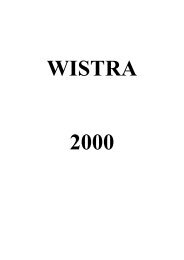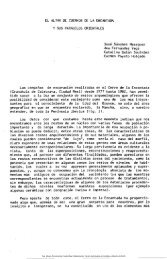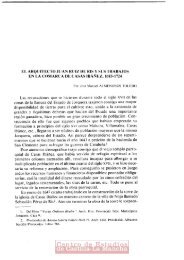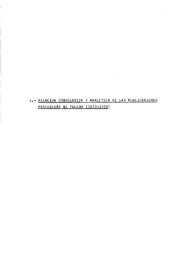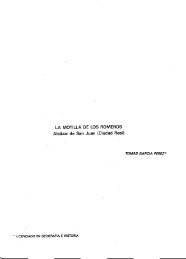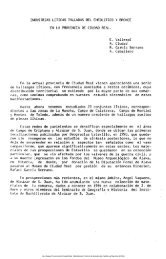BULLETIN FOR INTERNATIONAL FISCAL DOCUMENTATION 2000
BULLETIN FOR INTERNATIONAL FISCAL DOCUMENTATION 2000
BULLETIN FOR INTERNATIONAL FISCAL DOCUMENTATION 2000
Create successful ePaper yourself
Turn your PDF publications into a flip-book with our unique Google optimized e-Paper software.
<strong>BULLETIN</strong><br />
<strong>FOR</strong><br />
<strong>INTERNATIONAL</strong><br />
<strong>FISCAL</strong><br />
<strong>DOCUMENTATION</strong><br />
<strong>2000</strong>
<strong>BULLETIN</strong> <strong>FOR</strong> <strong>INTERNATIONAL</strong> <strong>FISCAL</strong><br />
<strong>DOCUMENTATION</strong><br />
<strong>2000</strong> Vol. 54 Num. 8<br />
ISSN : 0007-4624<br />
Título: MUNICH, A "CAPITAL OF GERMAN TAX LAW"<br />
Autor: Vogel, K. pg - 385-386<br />
Título: SUBJECTS AND SEMINARS OF THE <strong>2000</strong> CONGRESS<br />
Autor: pg - 387-388<br />
Título: DRAFT LEGISLATION ON THE FUTURE TAXATION OF BUSINESS<br />
ENTERPRISES IN GERMANY<br />
Autor: Mattausch, H. E. pg - 389-396<br />
Título: THE TAXATION OF GERMAN PARTNERSHIPS<br />
Autor: Lethaus, H. J.; Mohr, A. H. pg - 397-404<br />
Título: VALUE ADDED TAXATION IN GERMANY<br />
Autor: Reiss, W. pg - 405-413<br />
Título: <strong>INTERNATIONAL</strong> ASPECTS OF THE INHERITANCE TAX IN GERMANY<br />
Autor: Piltz, D. J. pg - 414-416<br />
Título: THE ARM'S LENGTH PRINCIPLE IN GERMAN TAX LAW<br />
Autor: Wassermeyer, F. pg - 417-424<br />
Título: TRANSFER PRICING IN GERMANY<br />
Autor: Baumhoff, H. pg - 425-433<br />
Título: GERMAN ANTI-AVOIDANCE RULES AND TAX PLANNING OF NON-<br />
RESIDENT TAXPAYERS<br />
Autor: Fuger, R.; Rieger, N. pg - 434-441<br />
Título: GERMAN TAX TREATMENT OF HYBRID FINANCIAL INSTRUMENTS IN<br />
CROSS-BORDER TRANSACTIONS<br />
Autor: Jacob, F. pg - 442-454<br />
Título: ADVANCE RULINGS IN GERMANY<br />
Autor: Eilers, S.; Schiessl, M. pg - 455-460<br />
Título: THE INFLUENCE OF EU LAW ON TAX TREATIES FROM A GERMAN<br />
PERSPECTIVE<br />
Autor: Lehner, M. M. pg - 461-470<br />
Título: GERMANY'S TAX TREATY POLICY
Autor: Krabbe, H. pg - 471-475<br />
Título: PERMANENT ESTABLISHMENT IN GERMANY'S TAX TREATIES<br />
Autor: Runge, B. pg - 476-478<br />
Título: THE TAXATION OF INVESTMENT FUNDS IN GERMANY<br />
Autor: Dehnen, P. H.; Groning, M.; Rhines, R. pg - 479-485<br />
Título: ECOLOGICAL TAX RE<strong>FOR</strong>M IN GERMANY<br />
Autor: Rodi, M. pg - 486-494
<strong>BULLETIN</strong> <strong>FOR</strong> <strong>INTERNATIONAL</strong> <strong>FISCAL</strong><br />
<strong>DOCUMENTATION</strong><br />
<strong>2000</strong> Vol. 54 Num. 10<br />
Título: TAX TREATY NEWS<br />
Autor: Vogel, K. pg - 502<br />
ISSN : 0007-4624<br />
Título: INTERPRETATION OF ARTICLE 15(2)(b) OF THE OECD MODEL<br />
CONVENTION: "REMUNERATION PAID BY, OR ON BEHALF OF AN<br />
EMPLOYER WHO IS NOT A RESIDENT OF THE OTHER STATE"<br />
Autor: De Broe, L.; Jones, J. A.; Ellis, M.; van Raad, K.; Le Gall, J.-P.; Torrione, H.;<br />
Vann, R.; Miyatake, T.; Roberts, S.; Goldberg, S. pg - 503-521<br />
Título: ARTICLE 26 OF THE OECD MODEL IN LIGHT OF THE RIGHT TO<br />
IN<strong>FOR</strong>MATIONAL SELF-DETERMINATION<br />
Autor: Schaumburg, H.; Schlossmacher, S. pg - 522-528<br />
Título: ENTREPRENEUR PACKAGE BILL IN THE NETHERLANDS: IMPORTANT<br />
CHANGES TO THE CORPORATE INCOME TAX<br />
Autor: Pijl, H.; Groeniger, F. O. pg - 531-536<br />
Título: CONSTITUTIONAL AND STATUTORY REQUIREMENTS <strong>FOR</strong> LEVYING<br />
TAX IN ESTONIA<br />
Autor: Lehis, L. pg - 537-544
<strong>BULLETIN</strong> <strong>FOR</strong> <strong>INTERNATIONAL</strong> <strong>FISCAL</strong><br />
<strong>DOCUMENTATION</strong><br />
<strong>2000</strong> Vol. 54 Num. 11<br />
ISSN : 0007-4624<br />
Título: GENERAL ANTI-AVOIDANCE RULES IN THE TAX LEGISLATION OF<br />
HUNGARY<br />
Autor: Foldes, G. pg - 558-564<br />
Título: TRANSFER PRICING IN CHINA<br />
Autor: Li, J. pg - 565-576<br />
Título: THE NEW VALUE ADDED TAX LAW IN LIECHTENSTEIN<br />
Autor: Seeger, N.; Jenny, C. pg - 577-582<br />
Título: REVIEW OF TWO RECENT OECD PUBLICATIONS ON TAX STATISTICS<br />
Autor: Messere, K. pg - 583-594
<strong>BULLETIN</strong> <strong>FOR</strong> <strong>INTERNATIONAL</strong> <strong>FISCAL</strong><br />
<strong>DOCUMENTATION</strong><br />
<strong>2000</strong> Vol. 54 Num. 12<br />
ISSN : 0007-4624<br />
Título: TAX TREATY NEWS<br />
Autor: Vogel, K.<br />
pg - 610-611<br />
Título: THE INFLUENCE OF THE OECD COMMENTARIES ON TREATY<br />
INTERPRETATION<br />
Autor: Vogel, K.<br />
pg - 612-616<br />
Título: THE INFLUENCE OF THE OECD COMMENTARIES ON TREATY<br />
INTERPRETATION - RESPONSE TO PROF. DR KLAUS VOGEL<br />
Autor: Ellis, M. J.<br />
pg - 617-618<br />
Título: DO WE STILL NEED TAX TREATIES?<br />
Autor: Easson, A.<br />
pg - 619-625<br />
Título: TAX ASSIGNMENT AND SUBNATIONAL <strong>FISCAL</strong> AUTONOMY<br />
Autor: McLure, C. E.<br />
pg - 626-635<br />
Título: TAX POLICY RE<strong>FOR</strong>MS IN GHANA<br />
Autor: Appiah-Kubi, K.<br />
pg - 636-643<br />
Título: DENMARK'S FAVOURABLE TAX REGIME <strong>FOR</strong> INWARD<br />
EXPATRIATES<br />
Autor: Ottosen, A. M.<br />
pg - 644-648<br />
Título: TAX ASPECTS OF TRUSTS IN ARGENTINA AND THEIR USE AS<br />
VEHICLES <strong>FOR</strong> RAISING CAPITAL<br />
Autor: Meloni, E. O.<br />
pg - 649-654
<strong>BULLETIN</strong><br />
<strong>FOR</strong><br />
<strong>INTERNATIONAL</strong><br />
<strong>FISCAL</strong><br />
<strong>DOCUMENTATION</strong><br />
2001
<strong>BULLETIN</strong> <strong>FOR</strong> <strong>INTERNATIONAL</strong> <strong>FISCAL</strong><br />
<strong>DOCUMENTATION</strong><br />
2001 Vol. 55 Num. 1<br />
Título: <strong>INTERNATIONAL</strong> TAX ISSUES IN A RAPIDLY CHANGING WORLD<br />
Autor: Lodin, S.-O.<br />
pg - 1-7<br />
Título: DIVIDEND FLOWS: TREATY RULES OR THE PARENT-SUBSIDIARY<br />
DIRECTIVE? THE ITALY-UK EXPERIENCE<br />
Autor: Gazzo, M.; Fleming, N.<br />
pg - 8-16<br />
Título: FINLAND'S IMPUTATION SYSTEM UNDER THE PRESSURE OF<br />
GLOBALIZATION<br />
Autor: Helminen, M.<br />
pg - 17-21<br />
Título: FIRST COMPREHENSIVE "REMEDIAL" REVIEW OF NEW ZEALAND'S<br />
GOODS AND SERVICES TAX<br />
Autor: Maples, A. J.<br />
pg - 22-32
<strong>BULLETIN</strong> <strong>FOR</strong> <strong>INTERNATIONAL</strong> <strong>FISCAL</strong><br />
<strong>DOCUMENTATION</strong><br />
2001 Vol. 55 Num. 2<br />
Título: CURRENT ISSUES UNDER EUROPEAN COMMUNITY LAW ON CROSS-<br />
BORDER DIVIDENDS<br />
Autor: Schwarz, J. S.<br />
pg - 46-51<br />
Título: TREATY RELIEF IN SWITZERLAND ON OUTBOUND INVESTMENT<br />
Autor: Hull, H. R.; Teuscher, H.<br />
pg - 52-61<br />
Título: THE <strong>FOR</strong>EIGN-INCOME EXEMPTION IN SPAIN AND THE CANARY<br />
ISLANDS SPECIAL ZONE<br />
Autor: Palao, C.<br />
pg - 62-67<br />
Título: SUBSTANCE VERSUS <strong>FOR</strong>M IN TAX PLANNING: RECENT CASES<br />
INVOLVING THE RAMSAY DOCTRINE<br />
Autor: VanderWolk, J.<br />
pg - 68-73<br />
Título: REVIEW OF PART II OF RUSSIA'S NEW TAX CODE<br />
Autor: Astakhov, E.; Zhestkov, S.<br />
pg - 74-80
<strong>BULLETIN</strong> <strong>FOR</strong> <strong>INTERNATIONAL</strong> <strong>FISCAL</strong><br />
<strong>DOCUMENTATION</strong><br />
2001 Vol. 55 Num. 3<br />
Título: TAX TREATY NEWS<br />
Autor: Vogel, K.<br />
pg - 91-92<br />
Título: INTERPRETING TAX TREATIES - A CANADIAN PERSPECTIVE<br />
Autor: Hausman, J. S.<br />
pg - 93-99<br />
Título: TRANS<strong>FOR</strong>MATION OF JAPAN'S CORPORATION TAX: 1988 TO <strong>2000</strong><br />
Autor: Masui, Y.<br />
pg - 100-106<br />
Título: CROSS-BORDER VALUATION <strong>FOR</strong> INCOME TAX, CUSTOMS DUTIES<br />
AND VAT<br />
Autor: Maisto, G.<br />
pg - 107-113<br />
Título: THE WINE-BOX INQUIRY IN NEW ZEALAND: ROUND TWO - A<br />
"GUTTED" REPORT BUT NO "KNOCKOUT PUNCH"<br />
Autor: Sawyer, A. J.<br />
pg - 114-125
<strong>BULLETIN</strong> <strong>FOR</strong> <strong>INTERNATIONAL</strong> <strong>FISCAL</strong><br />
<strong>DOCUMENTATION</strong><br />
2001 Vol. 55 Num. 4<br />
Título: PARTNERSHIP TAXATION IN SWEDEN<br />
Autor: Wiman, B.<br />
pg - 130-137<br />
Título: SOUTH AFRICA CHANGES TO A WORLDWIDE TAX SYSTEM<br />
Autor: Mazansky, E.<br />
pg - 138-146<br />
Título: THE TAX TREATMENT OF STOCK OPTIONS IN AUSTRIA<br />
Autor: Gahleitner, G.; Moritz, H.<br />
pg - 147-151<br />
Título: DID THE ECJ'S DECISION IN SAINT-GOBAIN CHANGE<br />
<strong>INTERNATIONAL</strong> TAX LAW?<br />
Autor: van den Hurk, H.<br />
pg - 152-157<br />
Título: DEVELOPING A TAX COMPLIANCE STRATEGY <strong>FOR</strong> REVENUE<br />
SERVICES<br />
Autor: James, S.; Hasseldine, J.; Hite, P.; Toumi, M.<br />
pg - 158-164
<strong>BULLETIN</strong> <strong>FOR</strong> <strong>INTERNATIONAL</strong> <strong>FISCAL</strong><br />
<strong>DOCUMENTATION</strong><br />
2001 Vol. 55 Num. 5<br />
Título: THE NEW TRANSFER PRICING REGULATIONS IN JAPAN<br />
Autor: Okada, Y.<br />
pg - 170-184<br />
Título: THE U.S. TREASURY'S SUBPART F REPORT: PLUS CA CHANGE, PLUS<br />
C'EST LA MEME CHOSE?<br />
Autor: Avi-Yonah, S.<br />
pg - 185-188<br />
Título: THE FRENCH FINANCE BILL <strong>FOR</strong> 2001: SPREADING VARIOUS TAX<br />
CUTS<br />
Autor: Marrer, V.<br />
pg - 189-192<br />
Título: RECENT CHANGES IN CORPORATE TAXATION IN HUNGARY<br />
Autor: Toth, K.; Kurucz-Varadi, K.<br />
pg - 193-199<br />
Título: SINGAPORE'S BUDGET <strong>FOR</strong> 2001: TAX REDUCTIONS AND<br />
MEASURES TO ENCOURAGE INNOVATION<br />
Autor: Hong, L. F.<br />
pg - 200-202<br />
Título: DIVIDEND FLOWS: TREATY RULES OR THE PARENT-SUBSIDIARY<br />
DIRECTIVE? THE ITALY-FRANCE EXPERIENCE<br />
Autor: Gazzo, M.; Girard, J.-M.; Demenge, P.<br />
pg - 203-211
<strong>BULLETIN</strong> <strong>FOR</strong> <strong>INTERNATIONAL</strong> <strong>FISCAL</strong><br />
<strong>DOCUMENTATION</strong><br />
2001 Vol. 55 Num. 6<br />
Título: THE "ONE TRUE MEANING" OF A TAX TREATY<br />
Autor: Jones, J. F. A. pg - 220-224<br />
Título: ARGENTINA'S TAX TREATY NETWORK AND THE<br />
DISTINCTIVE FEATURES OF ITS TREATIES<br />
Autor: Atchabahian, A. pg - 225-232<br />
Título: WEAK-CURRENCY BORROWINGS AND THE GENERAL<br />
ANTI-AVOIDANCE RULE IN CANADA: FROM SHELL CANADA TO<br />
CANADIAN PACIFIC<br />
Autor: Duff, D. G. pg - 233-240<br />
Título: TRIANGULAR CASES, TAX TREATIES AND EC LAW: THE<br />
SAINT-GOBAIN DECISION OF THE ECJ<br />
Autor: Jimenez, A. J. M.; Prats, F. A. G.; Carrero, J. M. C. pg - 241-253<br />
Título: THE ECJ'S DECISION IN AMID AND ITS IMPLICATIONS<br />
<strong>FOR</strong> BELGIAN COMPANIES<br />
Autor: Dassesse, M. pg - 254-259
<strong>BULLETIN</strong> <strong>FOR</strong> <strong>INTERNATIONAL</strong> <strong>FISCAL</strong><br />
<strong>DOCUMENTATION</strong><br />
2001 Vol. 55 Num. 8<br />
Título: TAX TREATY NEWS<br />
Autor: Vogel, K. pg - 319-320<br />
Título: PROTOCOL TO THE UNITED STATES-GERMANY ESTATE<br />
TAX TREATY<br />
Autor: Shannon, H. A. pg - 321-327<br />
Título: GLOBALIZATION, TAX RULES AND NATIONAL<br />
SOVEREIGNTY<br />
Autor: McLure, C. E. pg - 328-341<br />
Título: SOUTH AFRICA INTRODUCES CAPITAL GAINS TAXATION<br />
Autor: Mazansky, E. pg - 342-353<br />
Título: BELGIUM'S HOLDING COMPANY REGIME - THE<br />
DIVIDENDS-RECEIVED DEDUCTION AND CAPITAL GAINS<br />
EXEMPTION <strong>FOR</strong> SHARES<br />
Autor: Hinnekens, P.; Drijkoningen, P. pg - 354-360<br />
Título: AMENDMENTS TO DENMARK'S HOLDING COMPANY, CFC<br />
AND CAPTIVE INSURANCE COMPANY REGIMES<br />
Autor: Ottosen, A. M.; Hansen, L. C. pg - 361-364<br />
Título: TAX INCENTIVES <strong>FOR</strong> <strong>FOR</strong>EIGN DIRECT INVESTMENT -<br />
PART II: DESIGN CONSIDERATIONS<br />
Autor: Easson, A. pg - 365-375
2001 Vol. 55 Num. 9<br />
Título: OVERVIEW OF THE U.S. TAX CONSEQUENCES OF<br />
DISREGARDED ENTITIES<br />
Autor: Rachofsky, D. J. pp. 388-396<br />
Título: THE U.S. <strong>FOR</strong>EIGN TAX CREDIT <strong>FOR</strong> CORPORATE<br />
TAXPAYERS<br />
Autor: Vacovec, K. J.; James, T. S.; Hoiberg, L. L. pp. 397-406<br />
Título: ADVANCE RULINGS IN THE UNITED STATES<br />
Autor: Triplett, C. S.; Maloney, J. C. pp. 407-416<br />
Título: TRANSFER PRICING IN THE UNITED STATES: RECENT<br />
EVENTS AND EXPECTATIONS <strong>FOR</strong> THE FUTURE<br />
Autor: Wright, D. R. pp. 417-426<br />
Título: SALE OF SHARES TO RELATED COMPANIES: THE<br />
SURPRISING TAX CONSEQUENCES OF U.S. INTERNAL REVENUE<br />
CODE § 304<br />
Autor: Brewer, K. pp. 427-439<br />
Título: <strong>FOR</strong>EIGN ACQUISITION OF A U.S. TARGET GROUP AND<br />
SUBSEQUENT RESTRUCTURING<br />
Autor: Patton, B. L.; Monette, J. pp. 440-453<br />
Título: U.S. INCOME TAXATION OF <strong>FOR</strong>EIGN INVESTMENT IN<br />
U.S. REAL ESTATE<br />
Autor: Streng, W. P. pp. 454-467<br />
Título: TAX AND STRUCTURAL ASPECTS OF PRIVATE EQUITY<br />
INVESTING IN THE UNITED STATES: A PRACTICAL GUIDE <strong>FOR</strong><br />
NON-U.S. INVESTORS AND FUND MANAGERS<br />
Autor: Newberg, J. H. pp. 468-483<br />
Título: <strong>INTERNATIONAL</strong> JOINT VENTURES: SELECTED<br />
PRACTICAL CONSIDERATIONS<br />
Autor: West, P. R. pp. 484-492<br />
Título: MAKING SENSE OF U.S. <strong>INTERNATIONAL</strong> TAXATION: SIX<br />
STEPS TOWARD SIMPLIFICATION<br />
Autor: Avi-Yonah, R. S. pp. 493-497
Título: U.S. TAXATION OF <strong>FOR</strong>EIGN CORPORATIONS IN THE<br />
DIGITAL AGE<br />
Autor: McIntyre, M. J. pp. 498-506<br />
Título: U.S. TAXATION OF E-COMMERCE UNDER SUBPART F -<br />
MISSING PIECES LEAVE UNCERTAINTY<br />
Autor: Glicklich, P. A.; Leitner, A. pp. 507-512<br />
Título: THE U.S. TAX INCENTIVE <strong>FOR</strong> EXPORTS - TO BE OR NOT<br />
TO BE<br />
Autor: Hammer, R. M.; Green, W. H. pp. 513-522<br />
Título: THE QUIET REVOLUTION IN U.S. SUBNATIONAL<br />
CORPORATE INCOME TAXATION<br />
Autor: Stark, K. J. pp. 523-531<br />
Título: CURRENT ISSUES UNDER THE CANADA-UNITED STATES<br />
INCOME TAX TREATY - A TEN-YEAR PERSPECTIVE<br />
Autor: Boidman, N. pp. 532-544
2001 Vol. 55 Num. 11<br />
Título: KEY ISSUES AND OPTIONS IN <strong>INTERNATIONAL</strong><br />
TAXATION: TAXATION IN AN INTERDEPENDENT<br />
WORLD<br />
Autor: Guttentag, J. H. pp. 546-556<br />
Título: FIRST IMPRESSIONS FROM THE UNITED<br />
KINGDOM OF THE NEW UNITED KINGDOM-UNITED<br />
STATES TAX TREATY<br />
Autor: Jones, J. F. A. pp. 557-561<br />
Título: TAX TREATMENT OF STOCK OPTIONS IN<br />
DENMARK<br />
Autor: Pedersen, B. M. pp. 562-570<br />
Título: TAX CONCESSIONS AVAILABLE TO SMALL<br />
BUSINESS IN AUSTRALIA<br />
Autor: Hanegbi, R. pp. 571-579<br />
Título: TAX ASPECTS OF STRUCTURING AND<br />
DISPONSING OF INVESTMENTS IN MEXICO<br />
Autor: Fonseca, M.; Carcamo, L. pp. 580-586
<strong>BULLETIN</strong><br />
<strong>FOR</strong><br />
<strong>INTERNATIONAL</strong><br />
<strong>FISCAL</strong><br />
<strong>DOCUMENTATION</strong><br />
2002
, .<br />
APRIL 2002 <strong>BULLETIN</strong><br />
, CONTENTS<br />
ARTICLES<br />
VOL. 56 NO. 4 APRIL 2<br />
EU ANO US SALES TAXES IN THE OIGITAL AGE: A COMPARATIVE ANALYSIS<br />
Charles E. McLure, Jr.<br />
This article compares the VATs in the Europear Unjan and the state sales taxes in the United States.<br />
The article first describes several key characteristics of an ideal sales tax and notes the inherent difficulty<br />
of satisfactorily implementing sales taxes levied by local governments. The article next explains<br />
the basic operation of the two types of sales taxes, and then describes the structural defects in the<br />
existing US retail sales taxes and the EU VATs, the economic effects of the defects, the inherent difficulty<br />
of taxing digital content, and the proposals for reform made in the European Unjan and the<br />
United States. In an attempt to explain the differences described earlier, the last part compares the<br />
historical development of sales taxes in the United States and the European Unjan.<br />
MAJOR ISSUES ANO CHALLENGES IN <strong>FISCAL</strong> RESTRUCTURING IN ASIA<br />
Or Chia Ngee Choon ,<br />
As Asia becomes more; integratedinto the world economy, the trade-offs between the benefits of integration<br />
and the costs of surrendering fiscal autonomy become important considerations for tax policy<br />
and tax administration. Fiscal restructuring refers to the need to re-examine the revenue-raising<br />
capacity of a country and its spending needs and to make 'the necessary changes. This article examines<br />
the majar issues and challen~s facing policymakers in Asia as they restructure their fiscal systems<br />
in response to ~xternal changes and their domestic fiscal needs.<br />
AUSTRIAN COURT RULES ON THE:TF;:iEATMENT OF CROSS-BOROER LOSSES UNOER TAX TREATIES WITH<br />
EXEMPTION~ErHOO ¡<br />
Geral~Gahleitner and Clemens Nowotny ,<br />
In a recent decision, AuStria's-'¡'ighest court for tax litigation dealt with the treatment of losses of a foreign<br />
permanent establishment\under a tax treaty which provides for the exemption method for avoiding<br />
double taxation. In its decision, which deviates considerably from the court's former rulings and<br />
indicates a new reasoning independent of EC )aw, the court concluded that a loss sustained by a foreign<br />
permanent establishment may be offset against the taxable profits of the head office in Austria.<br />
This article examines the court's d~~.iplJ. and analyses its impacto<br />
OUAL RESIOENCE CONFLlCTS ANO THE ELlMINA~IPN OF <strong>INTERNATIONAL</strong> OOUBLE TAXATION IN FINLANO<br />
Prof. Or Marjaana Helminen .<br />
A dual residence conflict may arise. 'there a Finnish national who resided in Finland moves abroad,<br />
but does not break all pis substantial Tles with Finland. According to the three-year rule in Finland, the<br />
Finnish national will be treated, for Finnish tax purposes, as a Finnish resident and subject to unlimited<br />
tax liability in Finland in the year of emigration and the three subsequent years. The new state of<br />
, residence will also treat the taxpayer, for its tax purposes, as a resident of that state from the time of<br />
immigration. This article examines the extent to which Finland eliminates international double taxation<br />
in these cases in both non-treaty and treaty situations.<br />
TAXATION OF NON-RESIOENT COMPANIES UNOER KAZAKHSTAN'S NEW TAX COOE ANO TAX TREATIES<br />
Sholpan Isakova<br />
The new Tax Code of Kazakhstan carne into force on 1 January 2002 and replaced the Law on Taxes,<br />
numerous tax instructions and letters of the Ministry of State Revenues which had regulated the interpretation<br />
and application of Kazakhstan's international tax provisions, including tax treaties. This article<br />
reviews the rules in the Tax Code on the taxation of non-resident companies in Kazakhstan, ana-;<br />
Iyses the general approach to interpreting tax treaties, and examines the principal changes made to<br />
interpreting and applying Kazakhstan's tax treaties.<br />
MINING IN ZIMBABWE: INCOME TÁX ANO WITHHOLOING TAX CHANGES "r<br />
D.G. Murphy<br />
This article discusses the significant income tax and withholding tax changes which were made with<br />
respect to mining operations in Zimbabwe by the Finance Act, 2001 and the Finance Act, <strong>2000</strong>. The<br />
changes apply to "mining operations", as defined in the Income Tax Act of Zimbabwe, and include,<br />
,<br />
_:;I~=t,!..."<br />
() @ 2002 International Bureauof Fiscal Documentation
, 'c',,:"'..i\¡~<br />
::.w~~:~t~ <strong>BULLETIN</strong> APRIL 2002<br />
"'.tcC" "<br />
'*"~~"!";r:,~,, -c"<br />
-;;..,t!!;;.¡:among other things, amendments with regard to the ring-fencing of taxable income and assessed<br />
, :\;'~~?SS~eSlrom mining operations, the deductions for capital expenditure, and the new prohibited deduc-<br />
I!I"~ bons.<br />
,"t.,-); ~<br />
"'h~',
v.2002 B~LETIN ""'"";"""" 1<br />
,~ q:c;;:<br />
ITICLES<br />
CONTENTS<br />
VOL. 56 NO. 5 MAY 20(<br />
PLORING CARIBBEAN TAX STRUCTURE ANO HARMONIZATION STRATEGIES 1<br />
Amos C, Peters<br />
This article explores the tax structure and harmonization strategies of the Caribbean Community<br />
(CARICOM). After the introductory remarks, the article summarizes the major elements of the CARI-<br />
COM Single Market and Economy, examines the concept of harmonization, and dlscusses the tax<br />
harmonization eftorts in CARICOM and the European Unión, including the lessons that can be learned<br />
from the European Union. The article al so considers the arguments for and against tax harmonizatlon<br />
in the context of CARICOM, describes the tax structures in CARICOM, and presents a policy framework<br />
and suggested strategies for harmonization.<br />
~Y TAX CORPORATIONS? 1<br />
Richard M. Bird<br />
This article examines the question of why corporations should be taxed -in particular, why taxing<br />
corporations may be desirable, may be necessary, and may be convenient. The artlcle also discusses<br />
how to tax corporations and, in the conclusion, the article identifies some important factors in determining<br />
what can and should be done with respect to reforming corporate taxes.<br />
ITICAL APPRAISAL OF TAX EXPENOITURES ANO THE IMPLEMENTATION OF ENVIRONMENTAL POLICY IN<br />
STRALIA 21<br />
Hope Ashiabor<br />
Concerns about the threat posed to life and property by environmental degradation are increasingly<br />
taking centre stage in both domestic and international forums. The challenges PQsed by this threat<br />
have elicited varying policy responses from the regulatory authorities. This article IQoks at one aspect<br />
of that policy response, namely, the use of fiscal instruments by governments to ~hape the direction<br />
of their environmental policy. This article uses Australia's experience with tax expenditures and the<br />
implementation of environmental policy as a case study to provide a contempor¡jlry context for the<br />
analysis. The articles draws lessons from other OECO countries in suggesting rsfinements to Australia's<br />
tax expenditure rules.<br />
ROPEAN COMMISSION STRATEGY <strong>FOR</strong> COMPANY TAXATION IN THE EUROPEAN COMMtJNITY 2<br />
Jonathan S. Schwarz<br />
The European Commission recently presented formally its strategy for company ta~ation in the Europea<br />
n Union. The strategy was presented in a substantial and well-researched document which develops<br />
the general priorities established by the Commission in May 2001. This article discusses and<br />
comments on the Commission's strategy.<br />
VISEO CONOITIONS <strong>FOR</strong> TREATY REUEF IN SWITZERLANO 2<br />
Howard R. Hull and Hannes Teuscher<br />
This article updates an earlier article in the Bulletin and takes into consideration the favourable developments<br />
in Oecember 2001, when the Swiss Federal Tax Administration significantly revised and si mplified<br />
the Swiss domestic anti-abuse rules which apply when a Swiss resldent company claims relief<br />
from foreign withholdihg taxes on the basis of a tax treaty. The annex to the article serves as a summary<br />
guideline to the practical implementation of the new rules.<br />
IMULATIVE INDEX 2~<br />
o.' -~ 2002In .erna+¡'<br />
~ t lIt"<br />
onal Bureau01Ascal Documen+a.ion cc.."...<br />
,
~_~_~~~3 ,---,-_-<br />
I<br />
\X TREA TY MONITOR<br />
CONTENTS<br />
VOL. 56 NO. 6 JUNE 2002<br />
~X TAEATY NEWS 226<br />
Prof. Dr Dr h.c. Klaus Vogel<br />
JSTAALlA'S CAPITAL GAINS TAX ANO DOUBLE TAXATION AGAEEMENTS 228<br />
Prof. Aobert Deutsch and Nolan Sharkey<br />
On 19 December 2001, the Australian Taxation Office (ATO) issued a ruling entitled "Income tax and<br />
capital gains tax: capital gains in pre-CGT tax treaties". In the ruling, the ATO concluded that Australia's<br />
taxation of capital gains under the Income Tax Assessment Act 1936 Is not affected in any way<br />
by Australia's pre-CGT treaties (concluded before 20 September 1985, when capital gains became<br />
taxable in Australia). This article examines the ruling and points out the problems with the ATO's rea-<br />
soning.<br />
JMMAAY OF THE PAOCEEDINGS OF AN INVITATIONAL SEMINAA ON TAX TAEATIES IN THE 21ST CENTUAY 233<br />
Brian J. Arnold, Jacques Sasseville and Eric M. Zolt<br />
On 23-25 October 2001, an invitational seminar on the future of tax treaties wa$ held at the new<br />
offices of the IBFD in Amsterdam. The purpose of the seminar was to encourage t;'road-ranging discussions<br />
of the nature, raje and operation of tax treaties with a view to enhancing ~he understanding<br />
of tax treaties and identifying ways in which they might be improved. This article summarizes the discussions<br />
during the seminar.<br />
=tTICLE<br />
The appendix to the article contains background notes on the major topics discussed:<br />
-Jacques Sasseville, "The Aole of Tax Treaties in the 21 st Century" 246<br />
-Kees van Aaad, "Options for Greater International Coordination and Cooperation in thé Tax Treaty<br />
Area" 248<br />
-Michael J. Mclntyre, "Options for Greater International Coordination and Cooperation in the Tax Treaty<br />
A re a" 250<br />
-Aobert A. Green, "The Interaction of Tax and Non- Tax Treaties" 254<br />
-Eric Zolt, "Alternatives to the Existing Allocation of Tax Aevenues among Countries" 257<br />
-Klaus Vogel, "The Schedular Structure of Tax Treaties" 260<br />
-David Aosenbloom, "Comments on the Schedular Structure of Tax Treaties" 262<br />
-Hugh J. Ault, "Issues Aelated to the Identification and Characteristics of the Taxpayer" 263<br />
-Brian J. Arnold, "Taxing Business Profits" 264<br />
-Aobert Couzin, "Aelief.of Double Taxation" 266<br />
-John F. Avery Jones, "The Aelationship betwéen Domestic Tax Systems and Tax Treaties" 268<br />
-Jacques Sasseville, "Improving the Flexibility ot Tax Treaties: Part 1 -Generallssues" 271<br />
-Guglielmo Maisto, "Improving the Flexibility of Tax Treaties: Part 2 -Cross-Border Tax Issues arlsing<br />
from Corporate Aeorganizations" 272<br />
)ES THE AEACH OF THE EUAOPEAN COUAT OF JUSTICE EXTEND BEYOND THE EUAOPEAN UNjaN? 275<br />
Hans van den Hurk<br />
The recent decision of the European Court of Justice (ECJ) in the Jany case, which originated from<br />
the Netherlands, concerned the claim made by East European prostitutes -based on the association<br />
agreements concluded by the European Union with Poland and the Czech Aepubllc -that they should<br />
be able to work and settle in Amsterdam as prostitutes. This article considers, taking into account EC<br />
jurisprudence, the tax aspects of the European Economic Area Treaty in international tax law and discusses<br />
the purpose of association agreements. This article algo examines the tax aspects of association<br />
agreements, based on a case currently pending in the ECJ, which raises the question whether<br />
it is compatible with Commumty law for a Member Sta te (the Netherlands) to deny a tax deduction for<br />
interest paid in the Netherlands in connection with a foreign participation while, in the domestic con- ,<br />
text, the interest is deductible.<br />
lJMULATIVE INDEX 282<br />
~ ~tV\~ !~.~.~~.:~~~! ",. ._~_.. -~ M---! ,",- ~ --~-,-"--
I<br />
--<br />
AUGUST/SEPTEMBER 2002 ". <strong>BULLETIN</strong>, 345<br />
CONTENTS \<br />
: : VOL. 56 NO. 8/9 AUGUST/SEPTEMBER 2002<br />
lB F D<br />
ARTICLES<br />
INTROOUCTION TO THE 56TH IFA CONGRESS 348<br />
Jerome B. Libin<br />
SUBJECTS ANO SEMINARS OF THE 2002 CONGRESS 350<br />
OIRECT TAXES IN NORWAY -A BIRO'S-EYE VIEW 352<br />
Prof. Frederik Zimmer<br />
This article gives an overview of the direct taxes in Norway -the income tax, net wealth tax, payroll<br />
tax, inheritance tax and real estate laxo With regard to the income tax, which is the most important single<br />
tax, the article provides a brief historical background and summarizes the salient features of personal<br />
income taxation, including family taxation, the taxation of companies and partnershlps, and<br />
international taxation.<br />
THE TAXATION OF INCOME FROM CAPITAL VERSUS THE TAXATION OF EARNEO INCOME IN NORWAY 359<br />
Hakon L0chen<br />
One of the basic ideas of the 1992 tax reform in Norway was that, beca use capital is mobile, income<br />
from capital should not be taxed more heavily in Norway than in countries with which Norway compeles<br />
for capital. Another idea of the reform was that earned income should be taxed at progressive<br />
rates in arder to promote so me equalization of after-tax income. Complex problems surfaced when<br />
addressing the problem of how to tax enterprises run by the owners and other self-f3mployed taxpayers.<br />
This article sets out Norway's system for taxing capital income and the system for taxing earned<br />
income. The article also describes the allocation model and, in the concluding part, addresses the initiative<br />
taken this year to reform the reformed system.<br />
COMPUTING CAPITAL GAINS ON SHARES: A TEN-YEAR OLO -ANO SUCCESSFUL(?) -EXPERIMENT 364<br />
Prof. Ole Gjems-Onstad<br />
For ten years, Norway has conducted a unique experiment in taxing capital gains on shares. In<br />
English, the technique may be called the "Norwegian opening value adjustment method" or the "RISK<br />
method" (with a Norwegian acronym), which applies a kind of full imputation technique to the capital<br />
gains taxation of shares. The jury is still out concerning the RISK method but, at present, it appears<br />
most likely that the method will be continued. The final conclusion, the technological challenges, and<br />
the administrative costs of the system may warrant considerable interest from the international tax<br />
community and tax legislators in favour of the full imputation system for dividends. This article examines<br />
the RISK method.<br />
THE NOROIC MUL TILATERAL TAX TREATIES -<strong>FOR</strong> THE AVOIOANCE OF OOUBLE TAXATION ANO ON<br />
MUTUAL ASSISTANCE 371<br />
Odd Hengsle<br />
This article considers two Nordic multilateral tax treaties -the income and capital tax treaty for the<br />
avoidance of double taxation and the treaty on mutual assistance in tax matters. The article gives the<br />
historical background to the treaties and outlines their structure. With regard to the double taxation<br />
treaty, the article discusses the advantages and disadvantages of a multilateral tresty and describes<br />
the provisions of the treaty, including those of special interest. The article siso considers Norway's<br />
experience with the mutual assistance treaty.<br />
THE INHERITANCE TAX IN NORWAY 377<br />
Ivar Hobbelhagen<br />
This article summarizes the inheritance tax in Norway. The article discusses the tax model in Norway,<br />
the scope of the liability for the inheritance tax, the date the heir/recipient acquires a right of disposition<br />
ayer the asset, the method of valuation, allowances, international situations, and the expected<br />
changes in the law.<br />
.'. ) ); ¿ ~").c ;;<br />
, ).' @ 2002 Internatlonal Bureau of Fiscal Documentatlon )\!)' , ' !.,
~..,"" ~'1""<br />
This article describes the VAT system in Norway, originally introduced in 1970, and compares it with<br />
the EU V A T system, The article discusses, among other things, the sources and structure of Norway's<br />
VAT legislation, the tax mechanism, territorialscope, definitions, exemptions, taxable persons, tax-<br />
, able transactions, and exemption with credit (place of supply and zero-rating),<br />
'ERMANENT ESTABlISHMENTS AND ALLOCATION QUESTIONS PERTAININGTO THEM -JUDGEMENTS OF<br />
'HE NORWA y SUPREME COURT 392<br />
Eirik Jensen<br />
The Norway Supreme Court has, in a number of cases, been asked to clarify some issues relating to<br />
permanent establishments and the allocation questions pertaining to them, This article reviews the<br />
judgements of the Supreme Court that have addressed these issues, The judgements illustrate the<br />
basic attitudes underlying the Supreme Court's approach to these issues, which is notably characterized<br />
by a strong "substance over form" doctrine and a willingness to disregard the wording of tax<br />
treaties in favour of an interpretation based on other considerations..RANSFER<br />
PRICING IN NORWAY -THE CONCEPT OF ARM'S LENGTH CONDITIONS 401<br />
Einar Harboe<br />
This article looks at transfer pricing in Norway and the concept of arm's length conditions. The article<br />
discusses, a¡¡nong other things, the statutory ba~is for transfer pricing in Norway and the application<br />
of the OECD Transfer Pricing Guidelines which, although not formal.ly introduced into Norwegian law,<br />
are assumed to be in line with Norway's internallaw.<br />
'AX ASPECTS OF NATIONAL AND <strong>INTERNATIONAL</strong> MERGERS IN NORWAY 407<br />
Marianne Iversen<br />
This article considers the tax aspects of national and international mergers in Norway. The article first<br />
describes leQal mergers under Norwegian company law and the tax aspects of such mergers. The article<br />
then loo~s at the different types of international mergers and discusses the Norwegian company<br />
law and tax ~spects relating to them. The article also mentions some of the major accounting aspects<br />
of national aQd international mergers.NCOME<br />
TAX REGIMES IN NORWAY APPLICABLE TO SPECIAL BUSINESS SECTORS 415<br />
Stig Sollund<br />
This article gjves a brief overview of the special tax regimes in Norway applicable to three business<br />
sectors -th~ production and pipeline transport of petrOleum, the production of hydroelectric power,<br />
and shipping companies. The main focus is on how the special rules contrast with the general rules of<br />
business tax~tion in Norway.<br />
"AX lITIGATION IN NORWAY 421<br />
Per Sandvik<br />
The method for resolving tax disputes in Norway involves an appeal system within the tax administration<br />
combined with a right to have the decision reviewed in the courts. This article gives an overview<br />
of the administrative system in Norway and outlines the procedure fol.lowed by the courts, The article<br />
also describes some of the distinctive features of the tax litigation system in Norway and the courts'<br />
way of decidlng tax issues. In the last part, the article points out the main features of Norway's new<br />
system for binding advance rulings in connection with tax issues. e;1,rHE<br />
CONCEPT OF RESIDENCE <strong>FOR</strong> TAX PURPOSES IN NORWAY 427 !<br />
Sverre Hveding and Finn Backer-Gr0ndahl<br />
This article examines the concept of residence for tax purposes in Norway and the interpretation of<br />
"resident" under Norwegian domestic law. The first part of the article outlines the requirements for<br />
establishing tax residence in Norway and for terminating tax liability based on residence (emigration).<br />
The first part al so considers the rules on the cessation of worldwide tax liability in Norway due to a<br />
temporary stay abroad. The second part of the article gives an overview of the proposed amendments<br />
relating to the concept of residence and the recently adopted amendments relating to temporary stays<br />
abroad.<br />
rAX ISSUES REGARDING THE RELATIONSHIP BETWEEN JOINT-STOCK COMPANIES IN NORWAY ANDrHEIR<br />
SHAREHOLDERS 437<br />
Sven Rune Greni<br />
This article surveys of some of the main tax principies in Norway which are important when examining<br />
the relationship between joint-stock companies and their shareholders. The article illustrates how<br />
these principies are interpreted in selected areas, with special emphasis on different kinds of transactions<br />
between joint-stock companies and their shareholders. Most, but not all, of the issues discussed<br />
relate in particular to one-person-owned companies, family-owned companies or group transactions.<br />
@ 2002 International Bureau of Fiscal Documentation .'. ..0'.' c.<br />
c
'"!'¡<br />
AUGUST/sEPTEMBER 2002 <strong>BULLETIN</strong> c' 347<br />
=~ ..~--, , , ,-- -.,."'" , c~._"-~ "--~"";',;" ---<br />
t" TAXATION OF SALARY VERSUS CAPITAL GAIN IN NORWAY OF PERSONS IN DUAL RELATIONSHIPS 448<br />
t Kristian Kvamme<br />
There may, at times, be a dual relationship between two or more taxpayers, such as an employer and<br />
an employee, If the employer is a corporation, the employee may both render services to the corporation<br />
and have an ownership interest in it. In these situations, the questlon may arise whether a<br />
payment by the corporation to the employee should be taxed as a salary or as a capital gain. How this<br />
question is answered is important for both the employee and the employer, This article looks at transactions<br />
involving dual relationships and how they are treated for tax purposes in Norway.<br />
DEDUCTIBILlTY OF INTEREST PAID ON PROFIT-PARTICIPATING LOANS IN STOCK COMPANIES 456<br />
Ass. Prof, Hugo p, Matre<br />
Corporate financing may take a number of forms within the bounds of company and contract law in<br />
Norway. The basic forms of finance are equlty and debt, but the company laws also permit hybrid<br />
investment forms with elements of both debt and equlty, one such form being profit-participating<br />
loans. This article examines the nature of profit-participating loans in Norway, the nature of the interest<br />
paid on such loans, and whether the interest is deductible for the payer for tax purposes.<br />
TREATMENT OF INBOUND AND OUTBOUND EXPATRIATES IN NORWAY 463<br />
Johannes Brennhovd<br />
This article considers various aspects of the treatment of inbound and outbound expatriates in Norway.<br />
The article discusses, among other things, the rules pertaining to residence and work permits,<br />
when a person becomes a tax resident in Norway, the income tax aspects, including the impact of tax<br />
treaties, vacation allowances, Norway's National Insurance Scheme, and tax planning for inbound<br />
t and outbound expatriates.<br />
t<br />
c<br />
~ i;i<br />
"<br />
r;[¡<br />
IMPLlCATIONS OF HUMAN RIGHTS <strong>FOR</strong> TAX SURCHARGES AND PENAL TIES IN NORWAY 474<br />
Morten Wishman<br />
In Norway, as in many other countries, surcharges are used as deterrents to tax fraud and evasion.<br />
Until recently, surcharges were not regarded in Norway as a criminal retribution in a legal sense and<br />
were used both as an alternative to criminal prosecution and in addition to it. The application of surcharges,<br />
however, may be contrary to human rights, depending on the legal systen1l in question. This<br />
articie discusses the areas where there has been and perhaps still is a conflict betwfJen Norwegian tax<br />
law and human rights as embodied in the European Convention on Human Rights iand the UN International<br />
Covenant on Civil and Political Rights.<br />
TAX AVOIDANCE RULES IN SCANDINAVIAN AND ANGLO-AMERICAN LAW 485<br />
Bettina Banoun<br />
This article examines the tax avoidance rules in Scandinavian and Anglo-American Law and, in this<br />
context, considers the rules in various countries, including Norway, Sweden and Denmark as well as<br />
the United Kingdom, Ganada, Australia and the United States. The article discuss~s the "substance<br />
over form" doctrine and provides an in-depth discussion of the content of an ami-avoidance ruie.<br />
CUMULATIVE INDEX 493<br />
~<br />
~i<br />
!:: ,~<br />
I"';',;<br />
§f",j',"íi<br />
" ,,"";" c, -."<br />
@2002International Bureau 01 Rscal Documentation ',"..."" "," c, " ""<br />
", " C ',"" "" """, c
I ~. ~ ~!E N T S OCTOBE 200<br />
OCTOBER 2002 '-tr-~,;1 'i"SULtETIN -~i- ~--: 497<br />
.'<br />
TAX TREATY MONITOR<br />
TAX TREATY NEWS 498<br />
Prof. Dr Dr h.c. Klaus Vogel<br />
RENT -A-ST AR -THE PURPOSE OF ARTICLE 17(2) OF THE OECD MODEL 500<br />
Dick Molenaar and Dr Harald Grams<br />
This ar1icle examines the "Iimited" and "unlimited" approaches of Ar1. 17(2) of the OECD Model. Ar1.<br />
17 allocates the right to tax the income of ar1istes and spor1smen to the source country (although not<br />
exclusively). Ar1. 17(2), added in 1977, provides for the limited approach: the source country still has<br />
the right to tax the income when another person (not the ar1iste or spor1sman himself) receives the<br />
remuneration for the performance. The unlimited approach was recommended in the 1987 OECD<br />
Repor1 on ar1istes and spor1smen and was adopted in the 1992 Commentary to the OECD Model.<br />
Under the unlimited approach, Ar1. 17(2) is extended so that it applies to alllegal entities that could<br />
receive fees for ar1istic and spor1s performances, meaning that the profits of the separate legal entity,<br />
as well as the income of the ar1iste or spor1sman, are taxable under Ar1. 17(2). The main question<br />
addressed in this ar1icle is: What is fair and necessary regarding Ar1. 17(2) -the limited approach or<br />
the unlimited approach?<br />
THE STATUS OF DOUBLE TAXATION TREATIES IN MEXICO 510<br />
Pedro Arias<br />
Mexico, currently the only Latin American country that is a member of the OECD, has limited experience<br />
in concluding tax treaties -Mexico's first comprehensive tax treaties date back to only the early<br />
1990s. Never1heless, Mexico has published a Model Tax Convention, which is patterned after the<br />
OECD Model but emphasizes taxation by the source country. This ar1icle considers various aspects<br />
of the tax treaties concluded by Mexico, including whether tax treaties prevail ayer domestic law in<br />
Mexico.<br />
INTERACTION OF ARTICLES 6, 7 AND 21 OF THE <strong>2000</strong> OECD MODEL CONVENTION 516<br />
Raul-Angelo Papotti and Nicola Saccardo<br />
This ar1icle considers the treaty regime applicable under an OECD Model-type treaty to income from<br />
immovable property derived by a resident of a contracting state in the context of an enterprise. The<br />
discussion assumes that the resident carries on his entrepreneurial activity through a permanent<br />
establishment in the other contracting state and that the immovable property forms par1 of that permanent<br />
establishment. The ar1icle examines the treaty ramifications of the treatment of the income in<br />
three situations -when the immovable property is located (a) in the state in whi
.<br />
~ JUL y 2002 <strong>BULLETIN</strong> 285<br />
,<br />
CONTENTS<br />
VOL. 56 NO.7 JULV 2002<br />
T AX TREA TY MONITOR<br />
TAX TREATY NEWS 286 Prof. Dr Dr h.c. Klaus Vogel<br />
CHARACTERIZATION OF OTHER STATES' PARTNERSHIPS <strong>FOR</strong> INCOME TAX 288 John F. Avery Jones (United Kingdom), Luc De Broe<br />
(Belgium), Maarten J. Ellis and Kees van Raad (Netherlands), Jean-Pierre Le Gall (France), Henri Torrione (Switzerland), Toshio Miyatake (Japan),<br />
Sidney l. Roberts and Sanford H. Goldberg (United States), Jürgen Killius (Germany), Guglielmo Maisto and Federico Giuliani (Italy), Richard J. Vann<br />
(Australia), David A. Ward (Canada) and Bertil Wiman (Sweden)<br />
The OECD Partnership Report is a significant contribution to the discussion of how to treat partner- ships for tax treaty purposes when two states<br />
categorize a partnership-like entity differently, either as transparent or as opaque. This article examines why different treatment of other states'<br />
bodies (to use a neutral term) for tax purposes can arise, particularly from the way in which sta te s classify foreign bodies, thus giving rise to part of<br />
the problem addressed in the OECD Partnership Report. This article focuses more on the categorization of partnerships than on the differences in tax<br />
treatment, which is the main focus of the OECD Report.<br />
CANADIAN TAXATION OF <strong>FOR</strong>EIGN SERVICE PROVIDERS: TREATY ISSUES ANO COURT DECISIONS 321 Nathan Boidman<br />
This article discusses some important elements of the taxation of cross-border service providers in light of two recent decisions of Canadian courts,<br />
Cheek and Wolf. The article considers these two judgements separately and in conjunction with Dudney, decided a few years earlier. The article also<br />
reviews the decision in Dudney.<br />
ARTICLES<br />
TAX TREATMENT OF CROSS-BORDER INCOME DERIVED THROUGH A PARTNERSHIP -A FINNISH<br />
PERSPECTIVE 327 Dr Marjaana Helminen<br />
Cross-border investment or business may be carried out through an entity having the legal form of a partnership. The use of partnerships for crossborder<br />
operations involves complex international tax law issues. The tax treatment in the source state, the partnership state and the residence state<br />
of the partners may be unclear and inconsistent. This article examines from a Finnish perspective the tax treatment of cross-border income derived<br />
through a partnership.<br />
PROPOSALS TO REDUCE COMPLIANCE COSTS -A MIXED RESPONSE BY THE NEW ZEALAND GOVERNMENT 333 Adrian J. Sawyer<br />
The Ministerial Panel on Business Compliance Costs, established in October <strong>2000</strong> to advise the New Zealand government on ways to reduce the<br />
costs to business of complying with existing legislation, released a report in July 2001 in which the Panel, among other things, made 11<br />
recommendations for the government to consider for reducing tax compliance costs. In December 2001, the government released the discussion<br />
document Striking the Balance: Government Response to the Ministerial Panel on Business Compliance Costs. This article focuses on the taxation<br />
issues raised during the consultation, the recommendations made in the Panel's report, and the government's response to the reconimendations.<br />
BOOK REVIEW 341 CUMULATIVE INDEX 342<br />
@ 2002 Internation~1 ~ure~\i of Fi~g~1 OQg\Jm~ntgtiQn ,.
2002, v. 56, n. 11<br />
• Página 542-553<br />
Autor/es: Jimenez, AJM<br />
Título: DOMESTIC ANTI-ABUSE RULES AND DOUBLE TAXATION<br />
TREATIES: A SPANISH PERSPECTIVE - PART I<br />
• Página 554-562<br />
Autor/es: Pijl, H<br />
Título: THE CONCEPT OF PERMANENT ESTABLISHMENT AND<br />
THE PROPOSED CHANGES TO THE OECD COMMENTARY WITH<br />
SPECIAL REFERENCE TO DUTCH CASE LAW<br />
• Página 563-568<br />
Autor/es: Hong, LF<br />
Título: TAX CHANGES IN CHINA IMPENDING UPON ENTRY INTO<br />
THE WORLD TRADE ORGANIZATION<br />
• Página 569-578<br />
Autor/es: Berkhout, TM<br />
Título: DEPRECIATION AND DOWNWARD VALUE ADJUSTMENTS<br />
OF REAL PROPERTY ACCORDING TO SOUND BUSINESS<br />
PRACTICE IN THE NETHERLANDS
2002, v. 56, n. 12<br />
• Página 586-599<br />
Autor/es: McLure, CE<br />
Título: REPLACING SEPARATE ENTITY ACCOUNTING AND THE<br />
ARM'S LENGTH PRINCIPLE WITH <strong>FOR</strong>MULARY APPORTIONMENT<br />
• Página 600-605<br />
Autor/es: Lapidoth, A<br />
Título: THE 2002 INCOME TAX RE<strong>FOR</strong>M IN ISRAEL<br />
• Página 606-619<br />
Autor/es: Cockfield, AJ<br />
Título: THE LAW AND ECONOMICS OF DIGITAL TAXATION:<br />
CHALLENGES TO TRADITIONAL TAX LAWS AND PRINCIPLES<br />
• Página 620-626<br />
Autor/es: MartinJimenez, AJ<br />
Título: DOMESTIC ANTI-ABUSE RULES AND DOUBLE TAXATION<br />
TREATIES: A SPANISH PERSPECTIVE - PART






